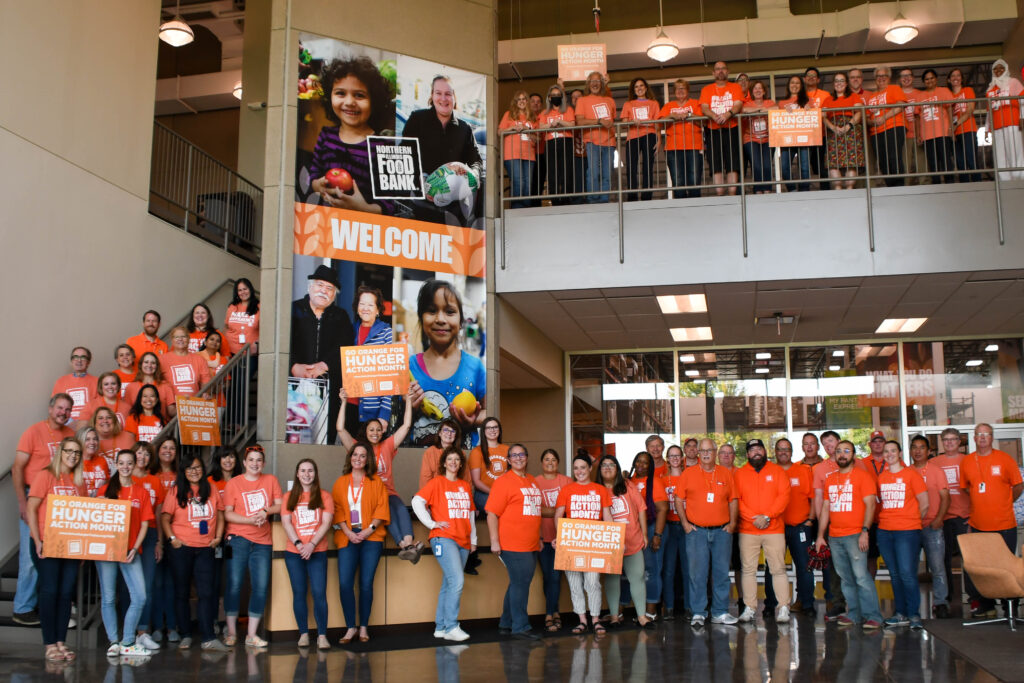Northern Illinois Food Bank 2024 Advocacy Agenda

Why Advocacy Matters
Food insecurity is a complex and multi-faceted issue that requires a multipronged approach. While Northern Illinois Food Bank works to meet the immediate symptom of food insecurity – hunger – through our network of food pantries, soup kitchens and meal sites, we also collaborate with national, state and local partners to address the root causes of food insecurity, lift our neighbors up, and build healthy communities that thrive. An important aspect of this work is advocating for policies that can decrease the existence of food insecurity and strengthen our communities.
Along with the non-profit, charitable food assistance network – of which the Food Bank is a part of – federal and state nutrition programs are an integral part of solving hunger. Due to these multiple approaches and programs working in concert with each other, Northern Illinois Food Bank plays an important role in educating the public and our elected officials on the realities facing the neighbors we serve.
By participating in key legislation discussions and advocating for food security policies, we are able to give a voice to not only our organization, but to our agencies and, ultimately, our neighbors. What we say and do can be the difference between having a meal on the table or not for families in Northern Illinois.
Our Advocacy Mission
In order to solve hunger in our service area, Northern Illinois Food Bank works with national, state and local partners to advocate for administrative and legislative policies that strengthen our communities and decrease instances of food insecurity.
Our Advocacy Team
Northern Illinois Food Bank’s internal Advocacy Team is comprised of experts in the areas of SNAP, TEFAP, Child Nutrition and Seniors. Our team meets monthly to discuss current policy issues and formulate strategies to engage with our elected officials. This team is led by the Food Bank’s full-time Communications and Advocacy Specialist.
Learn More About Programs/Policies that are Relevant to the Food Bank!
TEFAP
The Emergency Food Assistance Program (TEFAP) is vital for our continued operations at the Northern Illinois Food Bank. Under this program, the USDA purchases fruits, vegetables, and other staples from U.S. growers and producers and distributes these products to food banks across the country. Without this critical source of food, the Northern Illinois Food Bank would be without much needed resources for its neighbors. The upcoming Farm Bill is a crucial piece of legislation that can help strengthen programs like TEFAP and SNAP and we are calling on Congress to increase the amount of entitlement funding for TEFAP commodities as well as increase storage and distribution funds to help us better offset the costs of transporting TEFAP food. To learn more about TEFAP and its importance to food banks, please follow this link.
SNAP
The Supplemental Nutrition Assistance Program (SNAP) is the most effective anti-hunger program in the United States and helps over 40 million people secure food. Through this program, individuals using SNAP receive monthly funds through a benefits card, similar to a debit card, to buy groceries at local stores or farmers’ markets. The amount individuals receive each month depends on income and family size. Currently, 2/3 people who receive SNAP are kids, seniors or people living with disabilities. The Farm Bill is a critical opportunity to strengthen SNAP and we are calling on Congress to increase SNAP’s purchasing power by basing benefits on the Low-Cost Food Plan rather than the current Thrifty Food Plan and also remove enrollment barriers for adults, immigrants and college students. To learn more about SNAP and its importance, please visit this link.
Military Hunger
In 2020, nearly a quarter (24%) of active duty service members were food insecure. However, many US service members cannot access SNAP due to their Basic Allowance for Housing (BAH) counting as income in SNAP calculations. We are urging Congress to support the bipartisan legislation from Sens. Tammy Duckworth, D-Ill., and Lisa Murkowski, R-Alaska, that will help more service members access SNAP benefits by excluding the BAH from the gross income calculation for SNAP eligibility. To learn more about military hunger, please visit this link.
Child Nutrition Reauthorization
Child Nutrition Reauthorization (CNR) is the process that Congress uses to update child nutrition programs like summer and afterschool meals, school breakfast and lunch, and the Special Supplemental Nutrition Program for Women, Infants, and Children (WIC). The Child Nutrition programs continue to operate with or without reauthorization. Although this process typically happens every five years, Congress has yet to make significant updates since 2010. Without CNR, child nutrition programs generally can’t significantly expand or improve. To learn more about CNR, please visit this link.
Use Your Voice
Here are some other important steps you can take to help make sure all of our neighbors are able to thrive:
- Know your elected officials. Research your elected officials and see what they are doing to solve hunger. Not sure who your current elected officials are? Find out now.
- Register to vote. You have the power to elect legislators who are dedicated to eliminating hunger in your community. Make sure you register so your voice can be heard.
- Share your story. Have you been impacted by hunger, volunteered at a food bank or pantry, advocated for hunger-relief, or noticed the effects of hunger on friends, family, or neighbors? We want to hear from YOU! Sharing your story is one of the best ways to raise awareness of how hunger impacts our community. You could inspire someone to volunteer or donate a meal, motivate an elected official to draft hunger relief legislation, or help encourage neighbors to reach out when they need a little help. No story is too big or too small to make an impact. Share your story today to help solve hunger!
Questions?
For any additional questions, please contact our Senior Manager of Public Policy and Benefits, Melinda Craigs-Ingram via email at [email protected] or via telephone at (630) 443-6910 ext. 175.